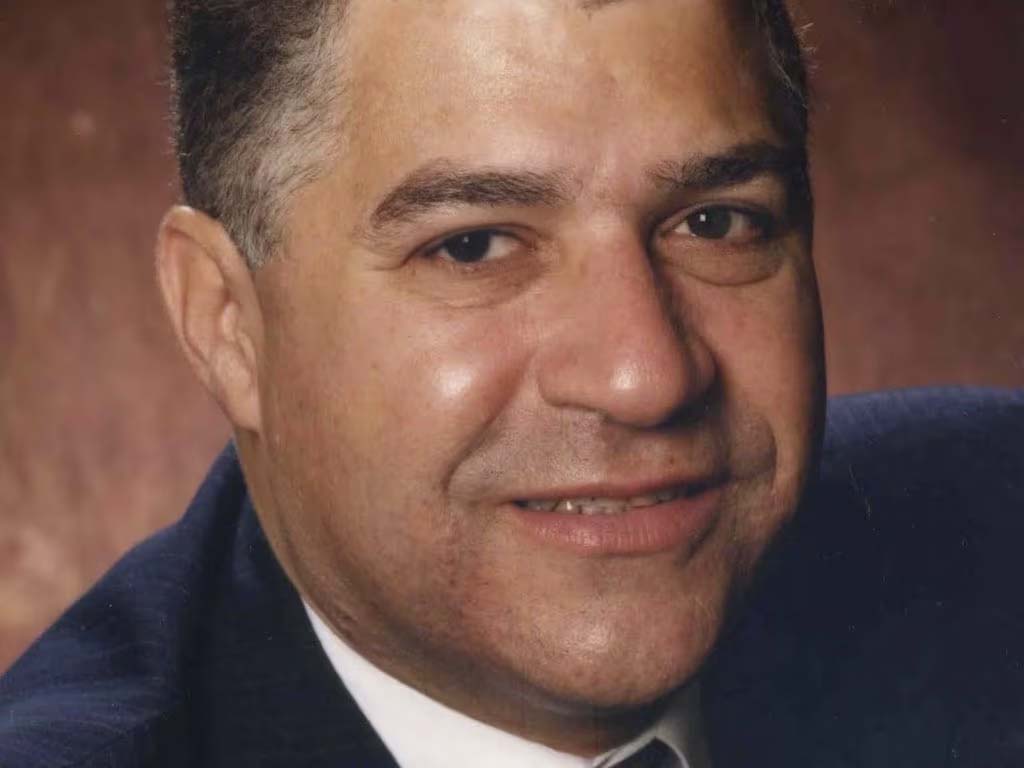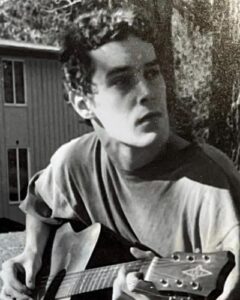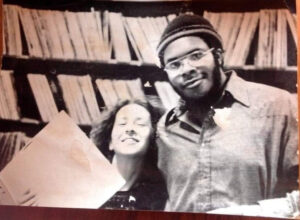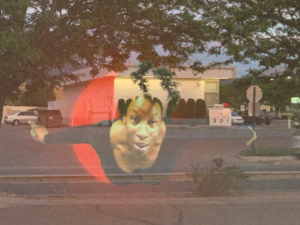 Jane Summer is pictured here on the left.
Jane Summer is pictured here on the left.
Q: How did you get the idea for your book?
A: I actually didn’t get the idea. The idea got me—in a leg-hold trap.
I grew tired of writing poems about how sad I was. After futzing around writing poems about the civil rights era and the Columbia space shuttle disaster, I re-read Muriel Rukeyser’s The Book of the Dead. Kenny Fries steered me to The Book of the Dead during my first residency, Elena Georgiou again during my third. They knew I felt tachycardiac about the need to write something simultaneously inside and outside of myself, something with social significance and who better to lead the way than Rukeyser? To be shamefully honest, I had always been a bad reader. In third grade I borrowed Little Women from the library only because my best friend read it and it was a big, serious book. I wanted my name to be on the lending slip. But it bored me to death. I couldn’t get deeper than five pages.
In school we’d been taught to read to get the story, the “what happened.” My college mentor the great poet Naomi Lazard taught me the story is often beside the point. Now I’m interested in the way the tale is told. Rukeyser, however, made both form and content work for each other. Her truly groundbreaking poem sequence gave me the nod, tacit approval, to write in the so-called documentary style about things that moved me emotionally, intellectually, culturally and politically.
Thinking of that third grader confounded by girl books, I decided with Erebus I was going to write the book I wanted to read. That meant poetry and prose, adventure and horror, sorrow and glory, blank space and pictures.
Q: Your book Erebus is about the crash of an Air New Zealand sightseeing flight over Antarctica in 1979. You had a friend on board this flight. Why did it take you so long to tell this story?
That’s complicated and I’m not 100% sure of the answer. What I know for certain is until the rise of the Internet I simply hadn’t access to information about the flight. There was nothing to write about, no story to tell. For decades all I knew was that my friend Kay’s plane had been “lost” over the Antarctic. While the details were well documented in New Zealand, and practically everyone of a certain generation knew someone on that flight, here in the States the news was scant.
The loss of Kay really threw me. You have to read the book to get the real dope on this but her death caused me such profound sorrow that the entire event eventually wormed its way into my subconscious. Or maybe I just forgot. Perhaps, as Freud says, there’s no difference between the two. Forgotten or repressed, the story insisted on being told and wouldn’t leave me alone until I served it. I don’t think I slept more than four hours a night during the time I worked on the book. It was a glorious obsession.
Q: What did you do when the going got rough?
My greatest difficulty lay not in the writing per se but in two other areas: protecting my writing space and attending to the business end of publishing. I stink at the latter—I’m uncomfortable being in the spotlight at readings and haven’t the patience for the paperwork of promoting the book. So, once the book came out things got pretty quiet.
As to the harder task, even a room with a door was no guarantee of uninterrupted time. Knocks, texts, shouts up the stairs, notes slipped under the door, a head popping in without knocking “just to say . . . “ —ai! I responded . . . curtly. Frankly, navigating my relationships was the least of my concerns.
The act of writing, for me, includes leaving my desk to make a peanut butter sandwich, walking in tall grass, driving at dusk, going to the movies (alone), reading, listening to the radio—many things I do by myself, in my own head. Most nonwriters in my life refuse to understood this. And I mean “refuse to” rather than “don’t” but that’s another essay. The minute I’d emerge from behind a closed door, even if only to go pee, I’d be besieged with talk, immensely disrupting my process. Frequently at first I calmly attempted to explain the writing mindset. Pointless. Heartbroken, furious, debilitated, and loosing confidence, I tried humor–wearing a sign lettered at work, posting darkroom in use on my door—while emotionally I fluctuated. My negativity hugely stole from my work. For the gazillionth time in my life I tried, fruitlessly, meditating.
In the family I was considered a miscreant, a disappointment, unpleasant as a rash. I made that peanut butter sandwich wearing my blank subway face and headphones that fell off a gardener’s truck.
Maybe not the best solution but it helped me plow through. Additionally, I scrounged around for other options: A psychiatrist friend let me use her office after hours during Hurricane Sandy, and I bartered with XV Beacon hotel in Boston, where I did my best work (probably because of my guaranteed privacy). While I was trained as a journalist, writing on deadline in a massive, cacophonous open-floor newsroom, poetry is work I need to hear in my head. I can’t even work with Bach in the background. Thus, the local library and coffee house weren’t sanctuaries. “Give her a room of her own and five hundred a year. . . .” Virginia Woolf, as usual, knew what she was talking about.
Q: You change POV a number of times in the narrative. Why did you make that choice?
There are many players in this true story. Mainly: Kay, her mother Marion, the CEO of the airline, numerous recovery workers who found the bodies in Antarctica, etc. The question was how to differentiate all their voices so as not to confuse the reader and yet keep their narrative integrated in the text. That is, I didn’t want to write the text as if dialog in a script. Nor did I want to be the only speaker reporting the story like a news item.
Since all of the people “spoke” to me with such individuality, even though I’d met, in real life, only Kay (I’ve been in contact with some of the recovery workers only post-publication), their vocal rhythms and vocabulary “arrived” with uniqueness. In doing research and finding actual documents—diary entries, for example—their particular voices are clear.
The rest was just imagination and creative formatting. I’d always been a purist as a poet—simple flush left poems, no initial caps. But the story of Erebus forced me to make use of the entire page. Dying voices, chaos in the fuselage, prevaricating CEOs, New Zealand police writing in the journals and steeling themselves for the worst—each voice had something urgent and unique to say. All would appear on the page differently visually, which influence the tempo and tenor of the speaker.
http://janegsp.wix.com/janesummer
Jane Summer, a New York City native, worked for two decades as an editor in women’s magazines. Her short fiction and poems have appeared in Ploughshares, Oregon East, Porcupine, Spoon River Poetry Review, North Dakota Quarterly, Literal Latte, Portland Review, Left Curve and the anthologies Lost Orchard (SUNY Press, 2015) and Devouring the Green (Jaded Ibis, 2015), among other publications. A.M. Homes selected her story “Peaceful Village” for selection in the Masters Review 2013 and Ruth Reichl chose her essay for a New York Times food writing essay. The editor of Not the Only One: Lesbian and Gay Fiction for Teens, Ms. Summer is also the author of The Silk Road (Alyson, 2000), a novel. Sibling Rivalry Press published her cross-genre work Erebus, about the 1979 Air New Zealand plane crash in Antarctica, in 2015. Ms. Summer received her BA from Kirkland College and MFA from Goddard College.








